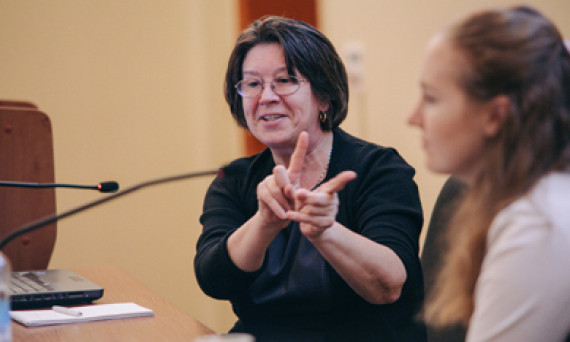The section “Health and Care” took place on November 8th. Professors and students from the Gender Studies program gave presentations that laid out two primary directions of the program’s activities: the gendered aspects of health studies, and the study of care as a social institution and practice.
Elena Zdravomyslova’s study of modes of care presented one of the section’s objectives. In her opening report, Zdravomyslova spoke of care studies as a developing trend in the social sciences. She presented the audience some theoretical foundations that stem from feminist paradigms and the concept of care as a specific type of social relation. Prof. Zdravomyslova emphasized that the study of care is not just theoretical, but is also oriented toward practical application — to change and improve care practices in order to make them more egalitarian.
Anna Temkina gave a report titled “How you choose a Doctor to make an appointment? Building Trust in the Field of Obstetrics,” in which she presented the results of her study on the obstetrics system in Russia. According to her report, in the process of preparing for and entering into motherhood, women put in serious efforts to collect information and organize their delivery. They evaluate various risks that are associated not only with their physiological questions, but also with insufficient trust in medical staff and the non-transparent hospital’s regulations. The strategies that patients choose reflect a spectrum from complete trust in the medical system to a rather critical approach to organizing their interactions with doctors.
Anastasiia Novkunskaia, a PhD student in the Department of Political Science and Sociology, gave a report titled “Care for Reproductive Health: Expectations and Practices of Russian obstetricians,” in which she examined patient care from the doctor’s perspective. Analysis of interviews with obstetricians and gynecologists allowed her to identify the key agents responsible for the reproductive health: the patients themselves, who are responsible for leading a healthy way of life; the government, called upon to ensure the proper standards of living and the material equipment of the healthcare system; and finally, doctors whose professionalism includes not only fulfilling their formal duties but the additional work of educating and providing emotional support to patients.
Olga Burmakova, a PhD student, presented part of her dissertation research in a report titled “Sexual Health in the Eyes of Sexologists.” In the discourse of sexologists, sexual health is associated with the concepts of norms and harmonies, which are interpreted through medical categories and through appeals to social norms and views. Love is one of the most important and universal categories in all discourses, and is considered by most sexologists to be a key component in healthy sexual relations.
The section concluded with the presentation of a recent issue of the journal Social Policy Studies dedicated to issues of reproductive health and edited by the Gender Studies program research associate, Ekaterina Borozdina.
Olga Burmakova











